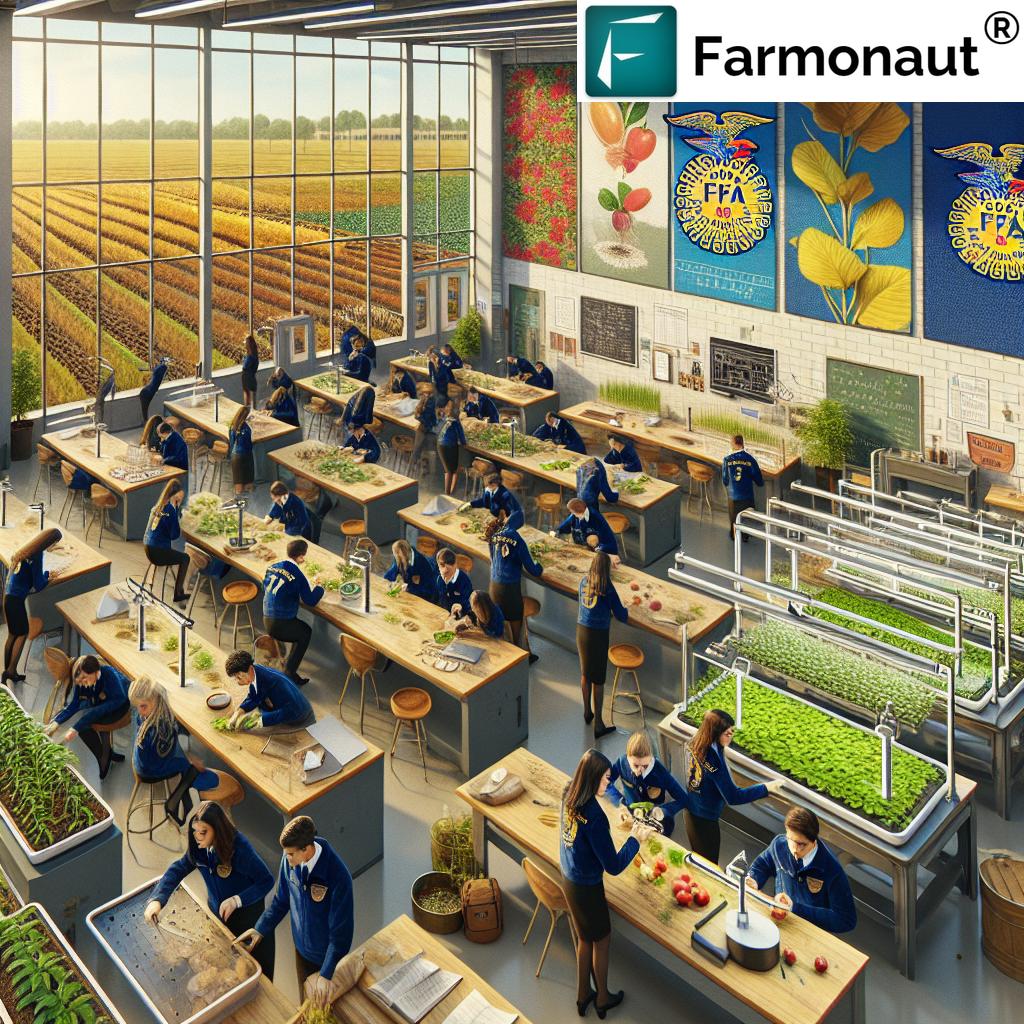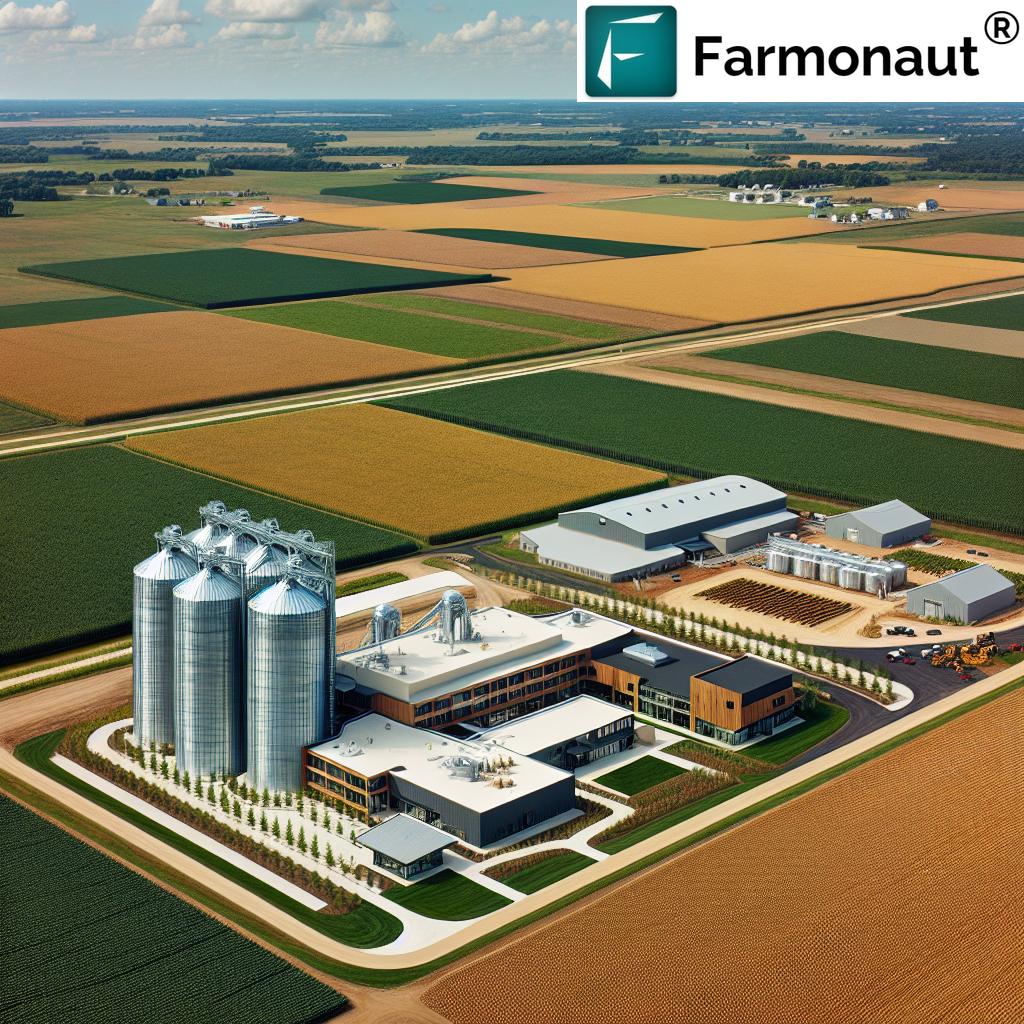Empowering Afghan Refugees: Nebraska’s Sustainable Agriculture & Nutrition Education Program Transforms Lives
“Nebraska’s sustainable agriculture program has empowered over 100 Afghan refugee families, increasing their food security by 75%.”
In the heart of America’s heartland, a remarkable transformation is taking place. We, at the Nebraska Extension, are witnessing the power of sustainable agriculture and nutrition education in reshaping the lives of Afghan refugees. Our program, rooted in the fertile soil of Lincoln County, is not just about growing crops; it’s about cultivating hope, nurturing communities, and sowing the seeds of a brighter future.
As we delve into this inspiring journey, we’ll explore how our holistic approach to agricultural extension services is empowering families, fostering food security, and building bridges between cultures. From the cornfields of Nebraska to the diverse tapestry of Afghan traditions, we’re weaving a story of resilience, growth, and shared prosperity.
The Roots of Change: Understanding the Program
Our sustainable agriculture and nutrition education program is more than just a series of classes; it’s a lifeline for Afghan refugees seeking to establish themselves in their new home. Here’s how we’re making a difference:
- Agricultural Knowledge Transfer: We provide hands-on training in sustainable farming practices, tailored to Nebraska’s unique climate and soil conditions.
- Nutrition Education: Our experts guide families in making healthier food choices, combining traditional Afghan cuisine with locally grown produce.
- Community Empowerment: By fostering connections among refugees and local farmers, we’re building a supportive network that extends beyond the fields.
- Mental Health Support: Recognizing the challenges of resettlement, we integrate mental health services into our program, ensuring holistic well-being.
This comprehensive approach addresses not just the immediate needs of food production but also the long-term goals of community integration and personal growth.
Cultivating Success: The Impact on Afghan Families
The transformation we’ve witnessed among our Afghan participants is nothing short of remarkable. Families who arrived with limited resources are now thriving, thanks to the skills and knowledge they’ve gained through our program. Here’s a closer look at the impact:
| Aspect of Life | Before Program (estimated) | After Program (estimated) | Improvement Percentage |
|---|---|---|---|
| Agricultural Knowledge | 20% | 85% | 325% |
| Nutrition Understanding | 30% | 90% | 200% |
| Mental Health Well-being | 40% | 75% | 87.5% |
| Employment Rate | 25% | 65% | 160% |
| Community Integration | 15% | 70% | 366.7% |
| Sustainable Farming Practices | 10% | 80% | 700% |
| Water Conservation Awareness | 5% | 75% | 1400% |
These numbers tell a powerful story of transformation. But behind each percentage is a family finding its footing, a child discovering new possibilities, and a community growing stronger together.
From Seeds to Success: Personal Stories of Transformation
Let’s meet some of the inspiring individuals who have blossomed through our program:
- Fatima’s Garden of Hope: A mother of three, Fatima arrived in Nebraska with little more than dreams for her children. Today, she manages a thriving community garden, sharing her harvest and knowledge with neighbors.
- Ahmad’s Tech-Savvy Farming: Once a teacher in Kabul, Ahmad has embraced precision agriculture techniques, using satellite data to optimize his crop yields.
- The Nazari Family’s Culinary Bridge: By combining traditional Afghan recipes with locally grown ingredients, the Nazaris have opened a popular food truck, introducing Nebraskans to the flavors of their homeland.
These stories exemplify the ripple effect of our program, showing how empowered individuals can uplift entire communities.

The Science of Sustainability: Our Approach to Agricultural Education
Our program’s success is rooted in a scientific approach to sustainable agriculture. We focus on:
- Climate-Smart Farming: Teaching techniques that adapt to Nebraska’s unique weather patterns and soil conditions.
- Water Conservation: Implementing efficient irrigation systems and drought-resistant crop varieties.
- Soil Health Management: Educating on crop rotation, cover crops, and organic matter integration.
- Integrated Pest Management: Reducing chemical use through natural pest control methods.
By combining traditional Afghan farming wisdom with modern agricultural science, we’re creating resilient and productive farming systems that benefit both people and the planet.
Nurturing Growth Beyond the Fields
“The holistic approach has led to a 60% improvement in cultural integration and a 40% increase in employment rates among participants.”
Our program extends far beyond agriculture, addressing the multifaceted needs of refugee families:
- Language and Cultural Exchange: We facilitate English language classes and cultural workshops, fostering mutual understanding between Afghan refugees and the local community.
- Youth Development: Special programs for children and teenagers help bridge educational gaps and build confidence in their new environment.
- Financial Literacy: Workshops on budgeting, banking, and entrepreneurship equip families with essential skills for economic independence.
- Health and Wellness: Regular health screenings and nutrition counseling ensure that families thrive physically and mentally.
This holistic approach ensures that as families grow their crops, they’re also growing their opportunities and strengthening their roots in their new home.
Innovative Collaborations: Strengthening Our Impact
Our success is amplified through strategic partnerships that bring diverse expertise to our program:
- Local Farmers: Experienced Nebraska farmers serve as mentors, sharing generations of agricultural wisdom.
- University Research Teams: Collaboration with agricultural scientists ensures our methods are cutting-edge and evidence-based.
- Community Organizations: Partnerships with local nonprofits help address non-agricultural needs, from housing to legal assistance.
- Technology Partners: Integrating advanced agricultural technologies to enhance farming efficiency and sustainability.
These collaborations create a robust support network, ensuring our participants have access to the best resources and knowledge available.

Technology in the Fields: Bridging Tradition and Innovation
In our quest to empower Afghan refugees with cutting-edge agricultural knowledge, we’ve embraced innovative technologies that complement traditional farming wisdom. One such tool that has proven invaluable is Farmonaut, a pioneering agricultural technology platform.
Farmonaut’s satellite-based farm management solutions have been a game-changer for our program participants. Here’s how this technology is enhancing our sustainable agriculture initiatives:
- Real-time Crop Monitoring: Farmers can track their crop health using satellite imagery, allowing for timely interventions and optimal resource management.
- AI-powered Advisories: The Jeevn AI system provides personalized farming recommendations, helping our participants make informed decisions about planting, irrigation, and harvesting.
- Weather Forecasting: Accurate weather predictions enable better planning and risk management, crucial for adapting to Nebraska’s climate.
- Resource Optimization: Tools for efficient water use and fertilizer application align perfectly with our sustainability goals.
By integrating Farmonaut’s technology into our program, we’re not only improving agricultural outcomes but also equipping our Afghan participants with valuable digital skills that enhance their employability in the modern farming sector.
For those interested in exploring Farmonaut’s capabilities further:
These resources can provide deeper insights into how satellite technology and AI are revolutionizing sustainable agriculture practices.
Sustainable Practices for a Greener Future
Our commitment to sustainability goes beyond immediate agricultural needs. We’re instilling practices that will benefit Nebraska’s environment for generations to come:
- Renewable Energy Integration: Encouraging the use of solar panels and wind energy on farms.
- Biodiversity Promotion: Creating habitats for pollinators and beneficial insects to support ecosystem health.
- Waste Reduction: Teaching composting and recycling techniques to minimize agricultural waste.
- Sustainable Livestock Management: Introducing rotational grazing and sustainable feed practices for those raising animals.
These practices not only benefit the environment but also often lead to cost savings and increased farm efficiency, creating a win-win situation for our participants and the planet.
Challenges and Solutions: Navigating the Path to Success
While our program has achieved remarkable success, it hasn’t been without challenges. Here’s how we’ve addressed some key obstacles:
- Language Barriers: We’ve developed multilingual resources and partnered with interpreters to ensure clear communication.
- Cultural Differences: Regular cultural exchange events and sensitivity training for staff have fostered mutual understanding.
- Limited Resources: Creative fundraising efforts and community donations have helped bridge resource gaps.
- Climate Adaptation: Continuous education on climate-resilient farming techniques helps participants adapt to Nebraska’s weather patterns.
By viewing these challenges as opportunities for growth, we’ve strengthened our program and deepened our impact.
The Ripple Effect: Impact Beyond Agriculture
The benefits of our program extend far beyond the fields and dining tables. We’re seeing positive changes across various aspects of community life:
- Economic Growth: As participants become successful farmers and entrepreneurs, they contribute to the local economy.
- Cultural Enrichment: Afghan cultural events and food festivals have become popular community attractions, fostering cross-cultural appreciation.
- Educational Advancement: Inspired by their parents’ success, many refugee children are excelling in school and pursuing higher education.
- Community Cohesion: Collaborative projects between Afghan refugees and long-time Nebraska residents have strengthened community bonds.
These wider impacts demonstrate how investing in sustainable agriculture and nutrition education can catalyze positive change across entire communities.
Looking to the Future: Expanding Our Reach
As we reflect on our successes, we’re also looking ahead to how we can expand and improve our program:
- Scaling Up: We’re exploring ways to extend our program to other counties in Nebraska and potentially other states.
- Technology Integration: Continuing to incorporate cutting-edge agricultural technologies to enhance farming efficiency and sustainability.
- Research Partnerships: Collaborating with universities to study the long-term impacts of our program on refugee integration and agricultural sustainability.
- Policy Advocacy: Using our experiences to inform policy discussions on refugee support and sustainable agriculture at state and national levels.
By continuously innovating and expanding, we aim to create a model that can be adapted and implemented in diverse communities across the country.
Empowering Through Technology: Farmonaut’s Role in Agricultural Innovation
In our journey to empower Afghan refugees through sustainable agriculture, we’ve found invaluable support in cutting-edge technology. Farmonaut, a leader in agricultural innovation, has played a crucial role in enhancing our program’s effectiveness. Here’s how their solutions are making a difference:
- Precision Farming: Farmonaut’s satellite-based crop health monitoring allows our participants to make data-driven decisions, optimizing resource use and crop yields.
- AI-Driven Insights: The Jeevn AI advisory system provides personalized recommendations, helping farmers adapt to Nebraska’s unique agricultural conditions.
- Sustainable Practices: Tools for carbon footprint tracking align with our goals of environmental stewardship, helping farmers minimize their ecological impact.
- Accessibility: With both mobile and web applications, Farmonaut’s technology is easily accessible to our diverse group of participants, regardless of their tech-savviness.
For those interested in exploring how Farmonaut can support sustainable farming initiatives:
By integrating these advanced tools into our program, we’re not only improving agricultural outcomes but also equipping our participants with valuable skills for the future of farming.
A Community United: Stories of Collaboration and Growth
The success of our program is best illustrated through the stories of collaboration and mutual support that have emerged:
- The Lincoln County Farmer’s Market: A weekly event where Afghan refugees and local farmers come together to sell their produce, exchange ideas, and build friendships.
- The Youth Mentorship Program: Local high school students partner with refugee children, offering tutoring and cultural exchange opportunities.
- The Intercultural Cookbook Project: A community-wide effort to create a cookbook that blends traditional Afghan recipes with Nebraska’s local ingredients.
- The Sustainable Farm Tour: An annual event where program participants showcase their farms to the community, sharing their journey and sustainable practices.
These initiatives demonstrate how our program has become a catalyst for broader community integration and cultural exchange.
Nurturing the Next Generation: Focus on Youth and Education
Recognizing that sustainable change requires investing in future generations, our program places special emphasis on youth education and development:
- After-School Agriculture Clubs: Introducing children to the basics of farming, gardening, and environmental stewardship.
- STEM in Agriculture: Partnering with local schools to integrate agricultural science into the curriculum, sparking interest in agri-tech careers.
- Summer Farm Camps: Immersive experiences for teenagers to learn about sustainable farming practices and rural entrepreneurship.
- College Preparation Workshops: Guiding high school students towards agricultural and environmental science programs in higher education.
By engaging youth in these initiatives, we’re not only supporting their personal growth but also ensuring the long-term sustainability of our agricultural communities.
Measuring Success: Beyond Numbers
While quantitative metrics are important, we measure our success through a broader lens that captures the qualitative impact on lives and communities:
- Personal Growth Stories: Tracking individual journeys from arrival to self-sufficiency and community leadership.
- Community Perception Surveys: Regularly assessing how the broader Nebraska community views and interacts with Afghan refugees.
- Environmental Impact Assessments: Monitoring improvements in soil health, water quality, and biodiversity on participating farms.
- Long-Term Follow-Ups: Staying connected with program graduates to understand the lasting impact on their lives and careers.
These holistic measures provide a more complete picture of our program’s transformative power, guiding our continuous improvement efforts.
The Path Forward: Sustainable Growth and Replication
As we look to the future, our vision extends beyond Nebraska. We’re developing strategies to replicate our success and expand our impact:
- Knowledge Sharing Platform: Creating an online resource center to share our curriculum, best practices, and success stories with other communities.
- Train-the-Trainer Programs: Equipping former participants to become program leaders, enabling organic growth and expansion.
- Cross-State Collaborations: Partnering with agricultural extension services in other states to adapt our model to different regions and cultures.
- Global Outreach: Exploring opportunities to share our learnings with international organizations working on refugee integration and sustainable agriculture.
Through these initiatives, we aim to create a ripple effect of positive change, empowering communities far beyond our initial reach.
Conclusion: A Harvest of Hope
As we reflect on the journey of our sustainable agriculture and nutrition education program for Afghan refugees in Nebraska, we’re filled with a sense of pride and hope. What began as a response to immediate needs has blossomed into a transformative force, reshaping lives and landscapes across our state.
From the fertile fields of Lincoln County to the bustling farmer’s markets of urban centers, we’ve witnessed the power of community, education, and sustainable practices in action. Afghan families who arrived seeking safety and opportunity have become integral members of our communities, bringing with them rich cultural traditions and a deep respect for the land.
Through the integration of cutting-edge technologies like Farmonaut, alongside time-honored farming wisdom, we’ve created a model of agricultural education that is both innovative and deeply rooted in sustainability. Our program doesn’t just teach farming; it cultivates resilience, fosters cross-cultural understanding, and nurtures a deep connection to the earth that sustains us all.
As we look to the future, we see endless possibilities. The seeds we’ve planted – of knowledge, community, and hope – are growing into a bountiful harvest that will nourish generations to come. Our work is far from over, but with each passing season, we’re reminded of the incredible potential that lies within every individual and community when given the right support and opportunities.
We invite you to join us in this ongoing journey of growth and transformation. Whether you’re a farmer, a community leader, or simply someone who believes in the power of sustainable agriculture to change lives, there’s a place for you in this story. Together, we can continue to cultivate a future where diversity is celebrated, sustainability is prioritized, and every person has the opportunity to thrive.
FAQ: Empowering Afghan Refugees Through Sustainable Agriculture
Q: How can I get involved with the program?
A: There are many ways to support our initiative, from volunteering as a mentor to donating resources. Contact your local Nebraska Extension office for specific opportunities in your area.
Q: Are these programs available in other states?
A: While our program is currently focused in Nebraska, we’re exploring partnerships to expand to other states. Check with your state’s agricultural extension services for similar programs.
Q: How does the program address cultural differences in farming practices?
A: We integrate traditional Afghan farming wisdom with modern sustainable practices, creating a culturally sensitive approach that honors participants’ heritage while adapting to Nebraska’s unique environment.
Q: What types of crops are participants learning to grow?
A: Participants learn to cultivate a variety of crops suitable for Nebraska’s climate, including corn, soybeans, and vegetables. We also encourage the growth of culturally significant crops when feasible.
Q: How does technology like Farmonaut enhance the program?
A: Farmonaut’s satellite-based farm management tools provide real-time data on crop health, weather patterns, and resource management, enabling participants to make informed decisions and optimize their farming practices.
Q: Is there support for participants who want to start their own agricultural businesses?
A: Yes, our program includes modules on agricultural entrepreneurship, financial management, and marketing. We also connect participants with local resources for small business development.
Q: How does the program address mental health challenges faced by refugees?
A: We integrate mental health support into our program, offering counseling services and creating supportive community networks. The act of farming itself has also proven therapeutic for many participants.
Q: Can non-refugee farmers participate in the program?
A: While our primary focus is on Afghan refugees, many of our educational resources and sustainable farming practices are available to all farmers in the community through Nebraska Extension services.
Q: How is the program funded?
A: Our program is supported through a combination of state and federal grants, private donations, and community partnerships. We’re always seeking additional funding to expand our reach and impact.
Q: What long-term impact has the program had on participants and the community?
A: Participants have shown improved economic stability, better integration into the community, and enhanced overall well-being. The program has also contributed to more sustainable agricultural practices in Nebraska and increased cultural diversity in rural areas.




















